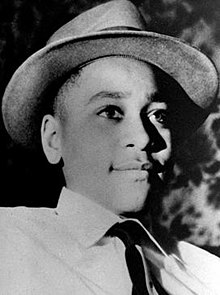Emmett Louis Till
| Emmett Till | |
|---|---|

Till in a photograph taken by his mother on Christmas Day 1954
|
|
| Born |
Emmett Louis Till July 25, 1941 Chicago, Illinois, U.S. |
| Died | August 28, 1955 (aged 14) Money, Mississippi, U.S. |
| Cause of death | Homicide |
| Resting place |
Burr Oak Cemetery Alsip, Illinois |
| Education | James McCosh Elementary School |
| Parent(s) |
Mamie Carthan Till-Mobley Louis Till |
Emmett Louis Till (July 25, 1941 – August 28, 1955) was a 14-year-old African-American who was lynched in Mississippi in 1955 after offending a white woman in her grocery store. The brutality of his murder and the fact that his killers were acquitted drew attention to the long history of violent persecution of African Americans in the United States. Till posthumously became an icon of the Civil Rights Movement.
Till was born and raised in Chicago and in August 1955, was visiting relatives near Money, in the Mississippi Delta region. He spoke to 21-year-old Carolyn Bryant, the white married proprietor of a small grocery store there. Although what happened at the store is a matter of dispute, Till was accused of flirting with or whistling at Bryant. Years later, Bryant disclosed that, in 1955, she had fabricated testimony that Till made verbal or physical advances towards her in the store. Till's reported behavior, perhaps unwittingly, violated the strictures of conduct for an African American male interacting with a white woman in the Jim Crow-era South. Several nights after the store incident, Bryant's husband Roy and his half-brother J. W. Milam went armed to Till's great-uncle's house and abducted the boy. They took him away and beat and mutilated him before shooting him in the head and sinking his body in the Tallahatchie River. Three days later, Till's body was discovered and retrieved from the river.
Till's body was returned to Chicago where his mother insisted on a public funeral service with an open casket. "The open-coffin funeral held by Mamie Till Bradley exposed the world to more than her son Emmett Till's bloated, mutilated body. Her decision focused attention not only on American racism and the barbarism of lynching but also on the limitations and vulnerabilities of American democracy". Tens of thousands attended his funeral or viewed his open casket, and images of his mutilated body were published in black-oriented magazines and newspapers, rallying popular black support and white sympathy across the U.S. Intense scrutiny was brought to bear on the lack of black civil rights in Mississippi, with newspapers around America critical of the state. Although initially local newspapers and law enforcement officials decried the violence against Till and called for justice, they responded to national criticism by defending Mississippians, temporarily giving support to the killers.
...
Wikipedia
